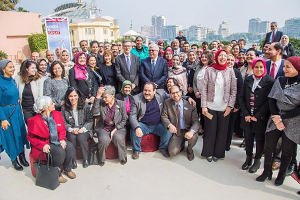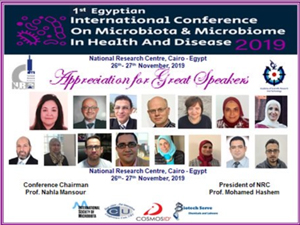Fighting foodborne diseases with the help of funding from an innovative UK-Egyptian innovation partnership – Professor Nahla Mansour of the National Research Centre in Egypt – Womanthology

Professor Nahla Mansour is specialist in microbial molecular biology at the Department of Chemistry of Natural and Microbial Products of Egypt’s National Research Centre. Nahla is also leader of the Gut Microbiota and Immunology Group. She has recently received funding from the Newton-Mosharafa Fund, a seven-year science and innovation partnership between the UK and Egypt, for her research project on foodborne diseases in partnership with the University of Nottingham.
“The fact that my project was selected by this fund made me proud and gave me a huge boost and confidence to face more challenges.”
From Cairo to East Anglia
When I finished my Bachelor of Science degree from the agriculture faculty of Cairo University, Egypt, I joined the National Research Centre (NRC), as I came to love scientific research.
After I got my master’s degree, I was nominated for a PhD scholarship abroad, funded by the Egyptian government, in genetic engineering, a new field which was a hot topic at the time. I, therefore, travelled to the United Kingdom with my family to enrol in this PhD programme at University of East Anglia’s (UEA’s) Biological Sciences School, where my experimental work has been based at the Institute of Food Research (IFR), now known as the Quadram Institute.
My study was focused on genetic engineering of the pyruvate metabolism pathway of Lactococcus lactis bacterium to produce other valuable or flavour compounds rather than the lactate, which is considered the main product of this bacterium. The strategies used were the deletion of some genes, overexpressing existing genes, or introducing new genes.
I was so lucky to be in such a dynamic place under the supervision of Professor Michael Gasson and Dr Claire Shearman. There, I mastered all the technology and tricks for genetic engineering within microorganisms, planning work, and analysing data.
Returning home to Egypt
After I obtained my PhD, in 2001, I returned to my home country, Egypt, to apply the experience I have obtained on my PhD at the National Research Centre’s Division of Pharmaceutical Research Industries, at the Department of Chemistry of Natural and Microbial Products.
I have struggled to adapt and apply what I learned from the new field “molecular biology and genetic engineering in microorganisms”. With the support of the National Research Centre, I have succeeded in establishing a Gut Microbiology and Immunology Group in my department at the NRC.
[Please see Note1 below]
Although the laboratory is small in size it has all the basic equipment and infrastructure essential for such research. I have received grants for local and international projects, in addition to in house funding projects from the NRC.
With the support of my colleagues, we also have just established the Egyptian Foundation for Microbiome Sciences and its Applications (EFMSA), a non-profit organisation for society and scientists interested in microbiome sciences and their effects on our life.
Advancing society through innovative research
Currently, I am a professor of microbial molecular biology in the Division of Pharmaceutical Research Industries, Department of Chemistry of Natural and Microbial Products, at the National Research Centre.
My role is to offer innovative research ideas which can advance our society, and to apply for research grants to fund these ideas, in addition to supervising my postgraduate students (doing a master’s degree or a PhD), and assisting junior colleagues in the department. I also contribute with my colleagues in the decisions of our department and division through our official monthly meeting.
In addition, since I am the principal investigator for my research projects, I am responsible for monitoring the workflow, analysis, and interpretation of the results, and presenting them in conferences and scientific journals.
About Egypt’s National Research Centre
The National Research Centre is the largest multidisciplinary research and development Centre in Egypt devoted to basic and applied research within the specific fields of interest. The centre was established as an independent public organisation in 1956, with the aim “to foster basic and applied scientific research, particularly in industry, agriculture, public health and other sectors of [the] national economy.”
Currently, it consists of 14 divisions and 109 departments, covering the major areas of industry: pharmaceutical research; health; environment; agriculture; basic sciences; and engineering. The centre is headed by a president with ministerial status, assisted by two vice-presidents, one for research and the other for technical affairs. The minister of state for scientific research is its president.
It is the largest of all institutions affiliated to the ministry of scientific research and employs about 60% of all scientists working in these fields.
Fighting foodborne diseases
I have done a research partnership with the University of Nottingham through the project entitled Probiotic bacteria to control Campylobacter foodborne disease, with Professor Ian Connerton, which shows that foodborne diseases transmitted to humans from farm sources are of international significance.
In addition to causing human morbidity and mortality, these foodborne diseases reduce agricultural production, decrease the availability of food, and cause obstacles to international trade. Of these, Campylobacter is the most common form of bacterial foodborne disease and is responsible for huge economic and societal costs. Controlling poultry colonisation as the main source of transmission into the human food chain will impact on the public health and economic capability.
In our project, we aimed for the selection of effective and specific probiotic strains in our laboratory in Egypt to compete with Campylobacter, using in vitro and in vivo experimental approaches, with the goal of improving food safety and restricting environmental dissemination (preventing it spreading). In addition, we aimed to investigate the mode of action of the selected strains against the Campylobacter, which will provide a basis to test their application in human therapy.
This work has been done by using state-of-the-art molecular biology, microbiology, and poultry science within the collaboration between our group at NRC, Egypt, and UK partner Professor Ian Connerton’s group at Nottingham University. They tested our strains which succeeded in competing with the colonisation of Campylobacter in chicken.
We are looking forward to establishing commercial efficacy of our probiotic strains for poultry in large scale trials in Egypt and the UK, in addition to the potential application for humans.
Unlocking opportunity through funding
The Newton-Mosharafa Fund is a science and innovation partnership between the UK and Egypt. It targets to establish and maintain sustainable, long-term, and mutually beneficial partnerships between the British and Egyptian science and innovation sectors.
In Egypt, the fund is financed jointly by the UK and the Egyptian Government. The funding in the UK side comes from the Department for Business, Energy & Industrial Strategy. In Egypt, the funding is contributed by the Ministry of Higher Education and Scientific Research.
The fact that my project was selected by this fund made me proud and gave me a huge boost and confidence to face more challenges. I am extremely grateful to the Newton-Mosharafa Fund for supporting me and my scientific ambitions.
Sharing our findings internationally
 With the help of the Newton-Mosharafa Fund, we started focusing on developing partnerships with the stakeholders in Egypt, as it increased their trust and allowed us to further engage with the business sectors.
With the help of the Newton-Mosharafa Fund, we started focusing on developing partnerships with the stakeholders in Egypt, as it increased their trust and allowed us to further engage with the business sectors.
We started that by sending information about our activity and project, doing a joint Egyptian/UK workshop) in 2017, and presenting our results in 2018 in an international conference entitled Microbiome, Host Resistance and Disease in Canada.
 After the project period ended on 31 March 2018, we continued to develop a partnership with the business sector by organising an international conference in Egypt about the microbiome in health and disease in 2019. Indeed, the Newton fund supported us a great deal and increased the networking within Egypt and other countries.
After the project period ended on 31 March 2018, we continued to develop a partnership with the business sector by organising an international conference in Egypt about the microbiome in health and disease in 2019. Indeed, the Newton fund supported us a great deal and increased the networking within Egypt and other countries.
 International collaboration brings insights into the problems of protocol and product applications that were not evident when working alone. Furthermore, it contributes to the capacity building through the fund, which allows the possibility to purchase equipment beyond our budget. Overall, the Newton Fund allows access to complementary partners, technologies and biological resources that would otherwise be inaccessible.
International collaboration brings insights into the problems of protocol and product applications that were not evident when working alone. Furthermore, it contributes to the capacity building through the fund, which allows the possibility to purchase equipment beyond our budget. Overall, the Newton Fund allows access to complementary partners, technologies and biological resources that would otherwise be inaccessible.
Making future plans to help improve living standards
For me as a professor at the National Research Centre in Egypt, I am doing my best to carry on my role and support my students, projects, colleagues, department, and division. I am still applying for every possible research grant and international collaboration.
For the National Research Centre itself, as it is the largest research centre in Egypt, it is providing more facilities and financial support for research strategies to keep up with the Egyptian Vision 2030 plan, which focuses on improving the quality of life of Egyptian citizens and improving their standard of living in various aspects of life
We also wish to continue our collaboration with Nottingham University, and the fund is the main key to achieving this goal.
Research interests in the Gut Microbiology and Immunology Group at Egypt’s National Research Centre
Construct genetically modified probiotic bacteria for oral vaccine carrier to overcome the problems of the injected vaccine
Construct genetically modified probiotic bacteria to express anticancer proteins
Isolation and molecular identification of ideal probiotic strains and bacteriophages for therapeutic uses
Isolation and molecular characterisation of probiotic bacteria to fight pathogens, such as Campylobacter and Clostridium difficile
Understanding the mechanism of probiotic bacteria on the host immune system
Investigation of the ecology of beneficial genes/enzymes within the probiotic genomic and determine their role in human health
Human Microbiome analysis to address its role in health and diseases which became an important research issue in the worldwide
